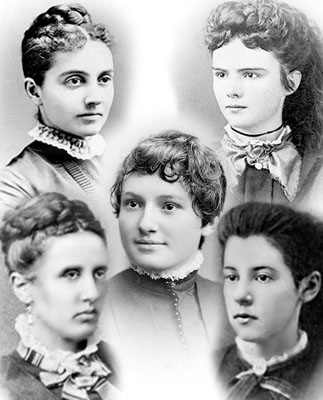It doesn’t seem strange in this day and age to see women on college campuses, but in the late 19th century, higher education for women was considered “experimental.”
In 1873, Dr. Edward Clarke, a member of the medical faculty at Harvard University, maintained in his book Sex in Education that educating women would be physically damaging to them. He asserted that the stress of study would leave women with “monstrous brains and puny bodies” and that allowing them to attend college would pose a serious health threat. Two potential outcomes of higher education, according to Dr. Clarke, were sterility and hysteria.
Two years before Dr. Clarke’s book was published, Colby College in Waterville, Maine, took the unprecedented step of admitting women students on an equal basis with men, and a young woman named Mary Low became the first female co-ed in all of New England. Two years later (the same year that Dr. Clarke’s book was published) four more young women joined her at Colby – Elizabeth Gorham Hoag, Ida Fuller, Frances Mann and Louise Helen Coburn.
While his assertions may seem ridiculous by today’s standards, his beliefs were not unusual at the time.
So…what do five young women from Maine have to do with my family?
Prior to 1975, children with disabilities were deprived of the free public education that their peers received – a diagnosis of Down syndrome led to a child being identified as “ineducable” and ”unfit to benefit from education in school.” Even when federal law mandated that they receive it, they were segregated from their peers. Today, many people still feel that children with intellectual disabilities, such as Down syndrome, don’t belong in regular classrooms.
The hard road to inclusion in the education of children with disabilities closely parallels that of the road to inclusion in higher education for women.
Those five young women from Maine became the founders of Sigma Kappa Sorority – my sorority – and today is recognized as Founders’ Day. I know a lot of you reading probably don’t “get” sorority, and that’s okay – this post has nothing to do with the benefits of being Greek. It is about five women who challenged the status quo. These five women – half the age that I am today – were confident they could do more. They didn’t believe the experts. They faced opposition…and triumphed.
In their quest to better themselves, they confronted the “soft bigotry of low expectations” and rejected the warnings of the so-called experts, and by doing so, they laid the groundwork for generations of women to follow in their footsteps.
These five women encourage me to challenge the status quo, to reject what the experts have to say if I believe that they are wrong (or biased), and to persevere in the face of opposition if a better life – including more opportunities – for me and mine is to be had on the other side.
Happy Founders’ Day, sisters.


Thank God for those that challenge the status quo!!!!
I linked to your post from a fellow SK FB page. I wanted to wish you a Happy Founders Day, and also let you know how much I love your blog. It is very close to my heart…thank you!
Those five women from Maine have to do a lot with my family, too. Without Sigma Kappa (Alpha Gamma chapter) being Homecoming partners with Theta Xi Fraternity in 2001, I would have never met my husband. Happy Founder’s Day! In Sigma, Danielle (PS – I found your blog through the Triangle article)
Some Dr. Edward Clarke was he didn’t have a clue women run the world 🙂